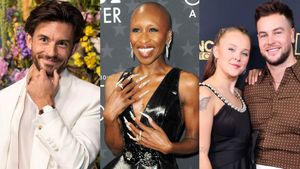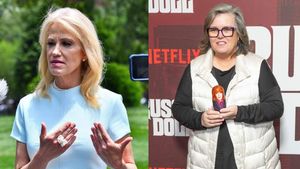It's Sunday in
England, and across the country many traditional stone
churches are struggling to fill their pews. But not C3, the
Cambridge Community Church, one of the country's many
evangelical groups. Its mostly white, middle-class
congregants crowd a rented school auditorium with
their arms outstretched to the heavens and their hands
fervently clapping to evangelical sermons.
''I don't need an
old church with stained glass windows where a few
people show up out of obligation, not inspiration,'' said
Ruth Chandler, a former member of the Church of
England.
In England's last
census, 72% of people identified themselves as
Christian. Many are Anglicans affiliated with the Church of
England, which was created by royal proclamation
during the 16th century after King Henry VIII, who
married six times, broke ties with the Roman Catholic
Church in a dispute over divorce.
But the Church of
England has said that fewer than 10% of its members are
regular churchgoers. By contrast, evangelicals make up about
40% of all the nation's regular churchgoers, according
to Peter Brierely, head of Christian Research, a
London-based think tank.
Among the
thriving conservative Christian churches in London are rich,
mostly white Anglican congregations in the evangelical wing
of the denomination, including Holy Trinity in
Knightsbridge. Years ago, the parish developed an
outreach course for newcomers called Alpha, which
explains the basics of Christianity. The course has been so
successful that it is now used for evangelism
worldwide.
The strong
evangelical presence became apparent during the recent
debate over a new law in Britain on gay rights.
Without a debate, the House of Commons passed the
Equality Act Sexual Orientation Regulations 2007
(SORs), which require full equality for gay men and lesbians
and outlaw discrimination on the grounds of sexual
orientation.
Christians
fiercely opposed the law, saying it would require their
adoption agencies to accept applications from gay couples,
make it illegal for Christian hoteliers to turn away
gays, and force religious schools to hire gays.
The Reverend Joel
Edwards, head of the Evangelical Alliance, an umbrella
group that claims 1 million members in Britain, said in an
interview that the issue is pushing ''evangelicalism
into a new mode of active citizenship, which I
welcome.''
As in the United
States, British religious groups are barred from allying
themselves with, or funding, a political party or a specific
candidate in an election. But organizations such as
the Evangelical Alliance issue position papers to
their followers on issues such as gay rights.
Theologically conservative Christians believe gay
relationships violate Scripture.
''The erosion of
Christian values increasingly reflected in our
legislation is an indication that Britain has lost its
Christian soul,'' wrote Edwards, a British immigrant
from Jamaica. ''In this post-Christendom Britain, we
cannot afford to neglect prayerful and spirit-led
strategies for long-term change, for this is much work to be
done.'' (Thomas Wagner, AP)




































































Charlie Kirk DID say stoning gay people was the 'perfect law' — and these other heinous quotes